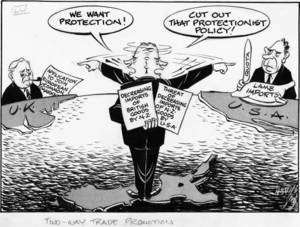Project G04: End of empire – Re-ordering in Australia, New Zealand and Canada (1960-1980)
Abstract
The project compares reactions in Australia, New Zealand and Canada to the decline of the British Empire from the late 1950s to the mid-1970s. Three subprojects analyse different aspects of the reactions to the British withdrawal: one focuses on foreign politics, one on economic debates and one on questions of national history and national culture. The focus in all three subprojects is on the planners and bureaucrats in the respective governmental departments, their interconnections and their actions and reactions concerning public debates.
Project Team
Project Leader:
Prof. Dr. Ewald Frie
Ph.D. Students:
Maike Hausen
Sebastian Koch
Clara-Maria Seltmann
Student Assistant:
Miriam Heinle
Academic Field
Contemporary History
Transnational History
Project description
Due to events such as the Suez crisis in 1956 and the British negotiations to enter the European Economic Community (EEC) in the early 1960s, the self-perception as being a part of a community of British peoples by the citizens of Australia, New Zealand and Canada faltered. This weakened the institutional, political and cultural ties between the former settler colonies and Great Britain and lead to a search for distinctive Australian, New Zealand and Canadian identities. Therefore, in all three settler colonies, people looked for new orientation apart from the British Empire. The project underlines the importance of British decolonization in the 1960s and 1970s for the nation-building and self-image in the settler colonies. While male white elites saw the situation after the Second World War as a threat to traditional values, opportunities arose for other groups, such as indigenous peoples and migrants, to change their living conditions in those countries. The transnational approach in this project enables the comparison of developments after Britain’s withdrawal from its former colonies and meets the need for transfers between the history of Canada, New Zealand and Australia.

Lodge, Nevile Sidney 1918-1989: Two-way trade promotion. Permission of the Alexander Turnbull Library, Wellington, New Zealand, must be obtained before any reuse of this image. Reference Number: B-134-106
The three subprojects:
1. The Economic Order
Ph.D. student: Clara-Maria Seltmann
The focus of this subproject is on the threat discourses and political actions in the context of the British negotiations with the EEC in the 1960s and 1970s. Using sources from central archives and important publications such as newspaper articles, this project analyses how politicians and journalists reflected on the economic order in the settler colonies and the consequences which may have arisen because of the British EEC entrance. The project examines cultural and historical aspects of the economy and compares the developments in Australia, New Zealand and Canada.
2. The Political Order
Ph.D. student: Maike Hausen
Based on sources of the Department of Foreign Affairs and newspaper articles, this subproject deals with debates on the reorganization of foreign policy in the settler colonies in the 1960s and 1970s. The focus is on the political ties between Great Britain and Australia, New Zealand and Canada. The study examines how politicians and journalists described the geopolitical space in which their young nation was situated, and how they developed a distinctive national identity after withdrawal of the British mother country. The project compares the developments in foreign policy in all three countries.
3. The Cultural Order
Ph.D. student: Sebastian Koch
This subproject studies scientific discourses on cultural factors of the nation-building process in Australia, New Zealand and Canada between 1960 and 1980. Based on sources from university archives, it examines threat discourses that emerged from the collapse of the cultural and political links between the British Empire and the settler colonies. These discourses linked experiences in the colonies with traditional British values and formed a national identity. This process can be observed in all three countries.
